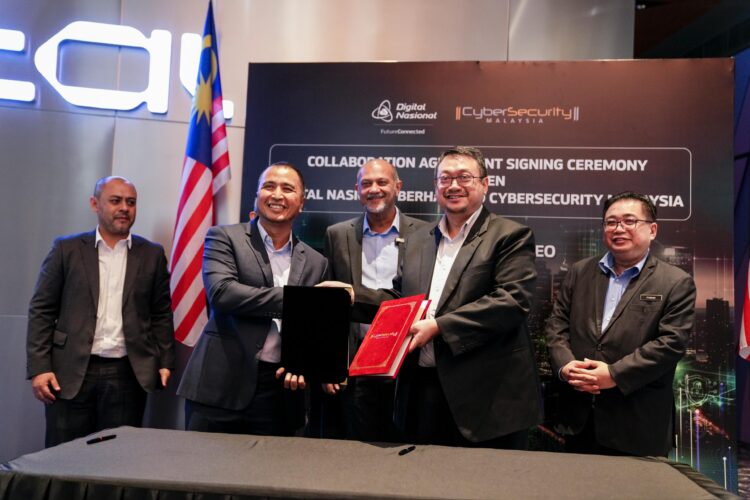Collaboration Agreement Signing Ceremony between Digital Nasional Berhad and CyberSecurity Malaysia officiated by Digital Minister YB Gobind Singh Deo
Minister’s message
Salutations:
1. Yang Berusaha Encik Fabian Bigar
Secretary General, Ministry Of Digital
2. Yang Berbahagia Datuk Hj Ahmad Zaki Zahid
Chief Strategy Officer of Digital Nasional Berhad
3. Yang Berbahagia Dato’ Ts. Dr. Amirudin Abdul Wahab
Chief Executive Officer, CyberSecurity Malaysia
4. Professor Dr. Mohd Nazri bin Kama
Director General, Department of Personal Data Protection
5. Encik Nasution Mohamed
Chief Operating Officer, Digital Nasional Berhad
Members of the Board of DNB
Leaders and representatives from government agencies & MNOs
Members of the media
Distinguished guests
Ladies & gentlemen.
Good morning and Salam Malaysia Madani.
1. I’d like to start by expressing my gratitude to Digital Nasional Berhad (DNB) for inviting me to witness the signing of this Collaboration Agreement between DNB and Cybersecurity Malaysia (CSM).
2. The 5G network is one of Malaysia’s Critical National Information Infrastructure (CNII) sectors, which are information
assets, processes, facilities, and services that are essential to the country. These systems impact national defence, economic
stability, governmental functions and social routines.
3. In our increasingly digital world, digital space has become an integral part of our daily lives, driving innovation, economic growth,and societal progress. However, these advancements bring with them significant challenges, particularly in the realm of cyber security.
4. Cyber security is a shared responsibility that necessitates the pooling of resources, intelligence, and expertise. By strengthening alliances and partnerships, we can enhance our collective ability to detect, prevent, and respond to cyber threats.
5. Cyber threats are not confined by borders; they are a global issuerequiring a concerted and collaborative response. The complexities and sophistication of cyber-attacks have grown exponentially, posing risks to our national security, economic stability, and public safety.
6. I echo the words of former IBM chairman, president and CEO Ginni Rometty, who said that cybercrime is the greatest threat to
every company in the world.
7. Therefore, in order to combat these threats effectively, it is imperative that we foster a culture of collaboration across
nations, sectors, and disciplines – especially those entities who operate in critical infrastructure sectors and digital platforms.
8. DNB and CSM, both of which are under the Ministry of Digital, have the same interest – to secure the digital landscape, including 5G, from cyber threats. The two entities, along with other key agencies such as Jabatan Perlindungan Data Peribadi (JPDP) have collaborated on cyber security-related matters since the beginning of 5G rollout in the country.
9. With Malaysia’s 5G network having achieved more than 81.8% coverage of populated areas, both DNB and Cybersecurity Malaysia acknowledge the importance of having a formalised cybersecurity collaboration, to strengthen our nation’s digital landscape, by signing this Partnership Agreement.
10. This partnership entails the development of 5G security guidelines,which will be utilised as a fundamental requirement for the industry,and serves as a guiding principle for future 5G security baseline.
11. This partnership also will see the establishment of a 5G Cyber Security Testing Centre, as well as the exchange of threat
intelligence information between the two entities, to further strengthen the nation’s cyberthreat combat capabilities.
Cyber Security Act 2024
12. We have entered a new era in the area of cyber security in Malaysia. Earlier this year, the Ministry of Digital introduced the
Cyber Security Bill 2024 in Parliament, and the bill was unanimously passed.
13. The Cyber Security Act 2024, officially gazetted by the AG’s Chambers last month, will enhance the nation’s cyber security
through compliance with specific measures, standards, andprocesses in managing cyber security threats.
14. This legislation is a major milestone in strengthening Malaysia’s cyber defences and enhancing our resilience against emerging
threats. This is crucial as the various critical sectors such as government, banking and finance, transportation, defence, energy,
healthcare and public facilities management, are typically targeted in cyber attacks.
15. With more sectors such as agriculture, logistics and trade undergoing digitalisation efforts, every cybersecurity incident can have a detrimental impact on the country’s economy and society.
16. The Act, along with more awareness and vigilance amongst Malaysian digital consumers, as well as collaborative efforts such as the one we are witnessing today, will help to protect us against cyber threats.
Increase in cybersecurity threats
17. Global cyber security firm Mandiant, a Google subsidiary, reported that between January 2023 and June 2024, the top four most
targeted industries are financial services, business services, high tech, as well as retail and hospitality. The same report also
said that there are more than 4,000 cyber threat groups operating worldwide, with many emerging threat groups observed every
year.
18. Cyber attacks are increasing in our region, as the threat actors are continuously scanning and adapting quickly to the latest developments around the globe.
19. In Indonesia last month, a hacker group managed to access and encrypt crucial systems at a national data centre, demanding almost USD 12 million in ransom from the Indonesian government. This attack disrupted more than 230 government agencies and services.
20. According to PDRM’s Commercial Crime Investigation Department(CCID), cybercrime cases in Malaysia nearly doubled from 10,753 in 2018 to 19,175 in 2022. Annually, Malaysia experiences hundreds of millions of virus
attacks, compromising a multitude of systems and user information.
21. Incidents such as these underscore the need for more consolidated efforts by players in the digital and cyber security sphere.
22. While we embrace groundbreaking advancements such as extended reality, AI and the Internet of Things, all players in the
government, private and civil sectors must work together to mitigate the risks that come with new technologies and innovations.
Protecting Malaysia’s 5G Network
23. To conclude, when DNB was set up in 2021, the mission was clear– to ensure that Malaysians across the nation have access to 5G connectivity and the immense possibilities that it brings.
24. This supply-led, inclusive approach was adopted to ensure that the digital divide between urban and rural communities, between the well-served and under-served, can be further narrowed and ultimately, closed.
25. Malaysia’s 5G network has been globally recognised as one of the best in the region and the world. In a March 2024 report, Ookla
stated Malaysia’s 5G network had the highest ‘Consistency Score’ globally for Q4 2023 at 97.3%, and that Malaysia continues to lead in
Southeast Asia in terms of 5G network performance.
26. In fact, 5G has helped to improve the overall mobile internet experience for Malaysians. The adoption rate of 5G in the country is currently at 43.6%, with more than 14.8 million 5G service subscriptions recorded to date.
27. These achievements must be built on further, to realise and materialise our vision of a Digital Economy. Our 5G network – the nation’s critical asset – needs to be protected, to ensure we continue earning the trust of all our stakeholders.
28. And on that note, I am happy to be here to witness this partnership between DNB and Cybersecurity Malaysia being formalised, and
hope to see more of such collaborations to protect our digital ecosystem.
Thank you.







